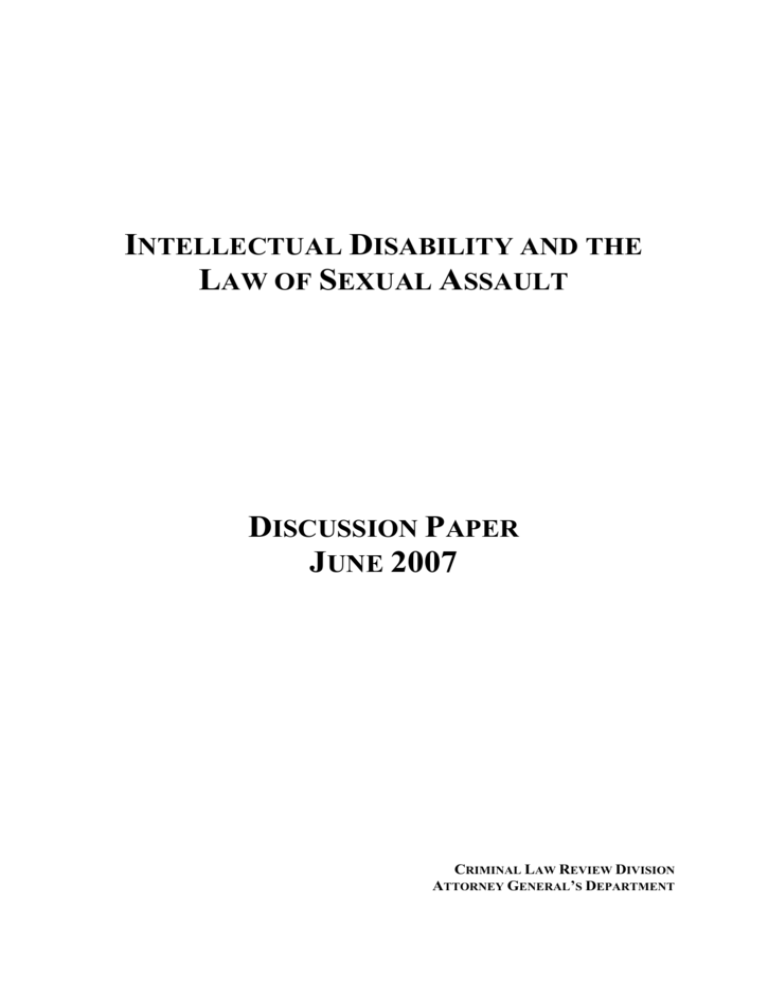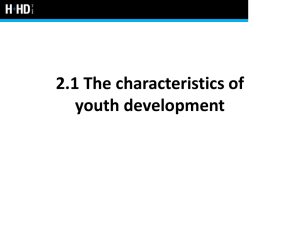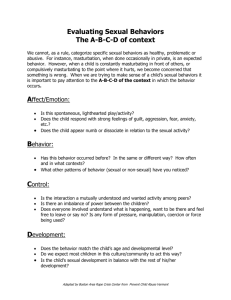
INTELLECTUAL DISABILITY AND THE
LAW OF SEXUAL ASSAULT
DISCUSSION PAPER
JUNE 2007
CRIMINAL LAW REVIEW DIVISION
ATTORNEY GENERAL’S DEPARTMENT
Address
Please forward responses to:
Criminal Law Review Division
NSW Attorney General’s Department
GPO Box 6
Sydney NSW 2001
DX 1227 Sydney
Ph: (02) 9228 7258
Fax: (02) 9228 7128
This report is also available on the internet at www.lawlink.nsw.gov.au/clrd
Deadline
Responses must be received by 28 July 2007.
2
INDEX
1.
Introduction
4
2.
Intellectual Disability And Sexual Assault
5
3
6
3.2.1
3.2.2
3.3
Sexual Offences in relation to victims with an
Intellectual Disability
Taskforce Discussions
Extending the scope of the offences to other care
arrangements
Volunteers and staff providing home-based care
Other acts of indecency
Sexual Exploitation of Vulnerable Persons
4.
Exposure Draft
14
3.1
3.2
3
8
9
10
10
11
1.
Introduction
In April 2006 the Attorney General’s Department released the Report of the Criminal Justice
Sexual Offences Taskforce entitled Responding to sexual Assault: the way forward.
This Report made numerous recommendations aimed at the improving the responsiveness of
the criminal justice system to sexual assault complainants, whilst ensuring that an accused
person receives a fair trial.
A number of the recommendations of the Taskforce have already been implemented in the
Criminal Procedure Amendment (Sexual and Other Offences) Act 2006 and there is a second
Bill currently before Parliament - Criminal Procedure Amendment (Vulnerable Persons) Bill.
One important issue considered by the Taskforce was the laws concerning sexual offences
against people with intellectual disabilities.
4
2. Intellectual Disability and Sexual Assault
People who have a cognitive impairment are more vulnerable to sexual assault and abuse
because they depend on others for assistance with daily life1. Other factors that are likely to
increase vulnerability to criminal victimisation are: their impaired judgment, deficits in
adaptive behaviour, accompanying physical disabilities which may inhibit the person
conveying sexual victimisation, the high risk environments in which they live and work, their
lack of knowledge about their rights, and the attraction of some abusers to environments in
which they will encounter vulnerable victims2.
The most frequently recorded crimes against intellectually disabled people are sexual
offences and physical assault3. Most sexual assaults occur in the victim’s place of residence,4
and often the abuser is someone known to the victim5. Despite statistics that indicate that
between 50-90% of persons with an intellectual disability will be sexually assaulted in their
lifetime6, there are very few prosecutions of offences committed against persons with an
intellectual disability. The Office of the DPP reports that in the period 2000 to 2005, 21
matters were prosecuted under s 66F Crimes Act 1900.7
Where a prosecution does proceed with respect to a complainant with an intellectual
disability, it is important that the process appropriately recognises the special needs of the
complainant.
Recent legislative amendments have addressed some concerns previously raised with respect
to the effective participation in the criminal justice system of sexual offence complainants
with an intellectual disability:
Prohibition of unrepresented accused persons from personally cross-examining
complainants in sexual offence proceedings (s 294A Criminal Procedure Act 1986 commenced 3 September 2003),
Creation of a presumption in favour of all complainants in sexual offence proceedings
being allowed to use alternative arrangements for giving evidence which include;
o giving evidence by closed circuit television (CCTV) or some other form of
video link;
o where CCTV is not available, using screens or alternative seating
arrangements to prevent the victim from having to come into direct contact
with the accused;
1
NSW Co-ordination Unit Sexual Assault of People with an Intellectual Disability Final Report (1990)
Hayes, S., ‘Sexual Violence Against Intellectually Disabled Victims’, Without Consent: Confronting Adult
Sexual Violence, pp. 201-208, at 203
3 Johnson K., Andrew R., and Topp V., 1988, Silent Victims: A Study of People with Intellectual Disabilities as
Victims of Crime, Victorian Office of the Public Advocate, Melbourne.
4
Carmody, M., ‘Invisible Victims: Sexual Assault of People with an Intellectual Disability’ (1991) 17 (2)
Australia and New Zealand Journal of Development Disabilities 229-236.
5
Turk,V. and Brown, H. ‘The Sexual Abuse of Adults with Learning Disabilities: Results of a Two Year
Incidence Survey’ (1993) 6 (3) Mental Handicap Research, 212.
6
Carmody, M., (1990), op cit; McCarthy, M., & Thompson D., (1996) Sexual Abuse by Design: an Examination
of the Issues in Learning and Disability Services, Disability and Society, Vol.11, No. 2 1996, pp 205-17; Sobsey
D., & Doe T., (1991) Patterns of Sexual Abuse and Assault, Sexuality and Disability (3) pp. 243-259;
Crossmaker M., (1991) ‘Behind Locked Doors-Institutional Sexual Abuse’, Sexuality and Disability (3) pp.10219
7
This information was provided after conducting a basic search of the DPP electronic case management system.
2
5
o allowing a support person to be present near the complainant when giving
evidence ( s 294B Criminal Procedure Act 1986 - commenced 6 July 2004),
Creation of a an obligation on judges to protect witnesses from improper questioning (s
275A Criminal Procedure Act 1986- commenced 12 August 2005);
Creation of a presumption in favour of closing the court when an adult sexual assault
complainant gives their evidence. There is an exception for a support person or persons so
complainants do not face the process alone (amendment to s 291 Criminal Procedure Act
1986-commenced 25 November 2005).
3. Sexual Offences relating to victims with an intellectual disability
In NSW, it is an offence to have sexual intercourse with a person with an intellectual
disability in certain circumstances which are detailed in s 66F Crimes Act 1900:
(1) In this section:
intellectual disability means an appreciably below average general intellectual function that
results in the person requiring supervision or social habilitation in connection with daily life
activities.
(2) Any person who has sexual intercourse with another person who
(a) has an intellectual disability, and
(b) is (whether generally or at the time of the sexual intercourse only) under the authority of
the person in connection with any facility or programme providing services to persons
who have intellectual disabilities,
shall be liable to imprisonment for 10 years
(3) Any person who has sexual intercourse with another person who has an intellectual disability,
with the intention of taking advantage of the other person's vulnerability to sexual
exploitation, shall be liable to imprisonment for 8 years.
(4) Any person who attempts to commit an offence under this section upon another person who
has an intellectual disability shall be liable to the penalty provided for the commission of the
offence.
(5) A person does not commit an offence under this section unless the person knows that the
person concerned has an intellectual disability.
(6) No prosecution for an offence against this section shall be commenced without the approval
of the Attorney General.
A person with an intellectual disability has a permanent condition of significantly lower than
average intellectual ability. The disability also results in “adaptive deficits”, that is, the
disability usually affects the person’s level of communication, social skills, and ability to live
independently. The policy behind the introduction of sexual offences against persons with an
intellectual disability appears to be that such members of the community are especially
vulnerable to sexual exploitation and assault. This policy, however, arguably also applies to
other persons who by reason of cognitive impairment, such as dementia or brain injury,
require assistance in their daily living. It is submitted that the provisions that presently apply
to sexual offences against persons with an intellectual disability ought to also apply to other
persons who by reason of impairment require care.
The current definition of “intellectual disability” in s 66F(1) Crimes Act 1900 is:
“an appreciably below average general intellectual function that results in the person
requiring supervision or social habilitation in connection with daily life activities”.
6
The Model Criminal Code Officers Committee (“MCCOC”) in 1995 recommended that the
term “mental impairment” be adopted, and that the definition be inclusive, not exclusive. It
was argued that the tribunal of fact would thereby not be restricted from finding that other
conditions may constitute mental impairment8. The definition put forward was:
“Mental impairment includes senility, intellectual disability, mental illness, brain damage and
severe personality disorder”.
Tasmania adopted a varied form of the definition, choosing not to include severe personality
disorders. The Queensland Criminal Code uses the term “intellectually impaired person”
which is defined as:
A person is an "intellectually impaired person" if the person has a disability—
(a) that is attributable to an intellectual, psychiatric, cognitive or neurological impairment or
a combination of these; and
(b) that results in—
(i) a substantial reduction of the person's capacity for communication, social interaction
or learning; and
(ii) the person needing support9.
The Victorian Crimes (Sexual Offences) Act 2006 substituted “cognitive impairment” for the
term ‘impaired mental functioning’. This amendment arose from a VLRC recommendation
that “cognitive impairment” was a more accurate description, and one that is widely used and
accepted by service providers. “Cognitive impairment” includes impairment because of
mental illness, intellectual disability, dementia or brain injury”10. The Northern Sydney
Health Sexual Assault Service supports the adoption of the term “cognitive impairment” in
the NSW legislation as it includes persons with dementia, intellectual disability and acquired
brain injury.
1. Should the definition of “intellectual disability” for offences under Section 66F(1)
Crimes Act 1900 be amended?
2. Should an appropriate definition be formulated that meets the objective of providing
protection to, and criminal sanction of, sexual offences committed against vulnerable
people who require supervision or assistance in their daily activities?
Should the definition include, but not be limited to, person with:
(a) an intellectual disability;
(b) a cognitive impairment as a result of an acquired brain injury;
(c) a cognitive impairment arising from a neurological disorder;
(d) a cognitive impairment arising from a developmental disorder (for example
Asperger’s Disorder);
8Model
Criminal Code, op cit, p.179
s 229F Criminal Code 1899 (Qld)
10 s 50 Crimes Act 1958 (Vic)
9
7
(e) dementia;
(f) autism?
3.1 Taskforce Discussion
The Taskforce agreed11 that the offences presently relating to persons with an intellectual
disability should be extended to include other persons in care arrangements, including
persons with a cognitive impairment as a result of acquired brain injury, neurological
disorder, or developmental disorder, as well as dementia, and autism.
The definition proposed by the NSWLRC12 requires that there be both a below average
intellectual functioning, and limitations in two or more of the following skill areas:
communication, self-care, home living, social skills, community use, self-direction, health
and safety, functional academics, leisure and work; such a test appears to be fertile ground for
differential expert opinion. The NSWLRC said that the current definition was criticised for
the reason that it is inconsistent with the term “intellectual disability” as understood by
psychologists.
This is a view in part shared by Associate Professor Hayes who states that the use of the
phrase “serious intellectual disability” as an aggravating feature under s61J(2)(g) Crimes Act
1900 is not a diagnostic term that is used by experts because the categories of intellectual
disability are “mild”, “moderate”, “severe” and “profound”. She argues that any intellectual
disability is serious because its diagnosis means that the individual falls into the lowest 2-3%
of the population in terms of their cognitive reasoning skills and adaptive behaviour skills,
and they have ongoing needs for support and services. In her opinion, the word “serious”
should be omitted; a recommendation that is supported by many members of the Taskforce13.
The Taskforce also said that the requirement of supervision or social habilitation appears to
indicate a higher level of disability than that experienced by many people with an intellectual
disability. Detective Superintendent Kim McKay agreed that the aspect of supervision needs
to be re-visited as a determiner of a person’s intellectual disability. For policy reasons, it is
argued that only those persons who by reason of their vulnerability require assistance in their
daily living should be protected by a special category of offence. The Legal Aid Commission
expressed the view that the provision should be directed to persons with a “significant”
impairment.
While the criticisms of the current definition are acknowledged, it is submitted that the
requirement of supervision or social habilitation ought to be a threshold requirement in
acknowledgement of the fact that some persons with a cognitive impairment will not be
inherently vulnerable by reason of their impairment, while others will be particularly
vulnerable to sexual exploitation because of the nature of their impairment.
The Legal Aid Commission, Women’s Legal Services, Victims Services, Dr Cossins, Associate Professor
Stubbs, and the DPP supported amendment to the definition of “intellectual disability” to include other cognitive
impairments.
12 “Intellectual disability” means a significantly below average intellectual functioning, existing concurrently
with two or more deficits in adaptive behaviour”.
13 Written submissions of Detective Superintendent Kim McKay, Women’s Legal Services, Dr Cossins,
Associate Professor Stubbs, the DPP and Victims Services.
11
8
Experts and agencies were approached with the question “what would an appropriate
definition be?” Honorary Professor Gething preferred a term such as “people with an
intellectual disability and/or cognitive impairment” arguing that this would cover all
conditions. Associate Professor Hayes, however, advised that an expression to cover all of the
above impairments is difficult to develop. This is partly due to the difficulty in ascertaining
the cognitive impairment that renders the individual vulnerable. While intellectual disability
can be measured by tests of IQ and adaptive behaviour, assessment of other forms of
cognitive impairment is not so straightforward. For example, there is no “cut-off score” for
autism or Asperger’s Disorder, or dementia, that defines the disorder14.
3. Should the words “an intellectual disability” in Section 66F(2) and (3) be replaced with
the term identified as appropriate (following consultation)?
4. If the definition is amended, should the circumstance of aggravation that the victim has
a serious intellectual disability (for example, under Section 61J(2)(g) Crimes Act 1900 –
Aggravated Sexual Intercourse without Consent), be amended in similar terms?
3.2 Extending the scope of the offences to other care arrangements
The NSWLRC recognised the difficulty in finding an appropriate balance between protecting
sexual autonomy and preventing the sexual exploitation of persons with an intellectual
disability. Such a dilemma is acknowledged by Associate Professors Carmody and Hayes
who argue that the concern to protect people with an intellectual disability from exploitation
needs to be balanced with the person’s right to live full and ‘normal’ life, including the right
to sexual expression.
Section 66F(2) creates an offence by a person in authority to have sexual intercourse with a
person with an intellectual disability. It may be assumed that the prosecution would not have
much difficulty in proving that the accused had knowledge of the complainant’s disability.
In order to provide greater protection to intellectually disabled people, the NSWLRC
recommended that s 66F(2) be redrafted to cover all relevant carers, including volunteers and
staff providing home-based care, but not prohibit sexual relations between consumers of the
same service15. Similarly, the VLRC determined that such an offence should be confined to
specified situations in which people with impaired mental functioning are particularly
dependent and therefore vulnerable, that is, the offence should be targeted at carers.
In considering sexual offences against persons with mental impairments, MCCOC were of
the view that there had to be a distinction between truly exploitative sexual contact between
14
Written submission of Associate Professor Susan Hayes.
In some facilities, some consumers of a service (who have a cognitive impairment) assume responsibility
roles, and arguably could be considered to be persons in authority for the purposes of s 66F(2). It is to this group
of persons of whom the Commission is concerned should be expressly excluded from being criminally
responsible by operation of the section.
15
9
mentally impaired persons and their carers, and sexual contact with a carer to which a persons
with some degree of mental impairment might nevertheless freely and voluntary consent.
They argued that otherwise, sexual offences would arbitrarily restrict the sexual autonomy of
mentally impaired persons when it comes to their carers. MCCOC recommended a limited
definition of consent which requires consideration of the consent of the impaired persons, but
also whether such consent was unduly influenced by the fact that that the accused was
responsible for the care of the mentally impaired person.16
The view of the VLRC was that the Victorian provisions specified an appropriate standard of
behaviour for those providing services to people with a cognitive impairment. To lend further
support to the prohibition on sexual relations with persons in their care, the VLRC quoted
statistics derived from OPP records which showed that only 17 prosecutions took place
between 1996 and 2004 for offences under ss 51 and 52 Crimes Act 1958 (directed only to
persons who provide services to a person with a cognitive impairment, or who work within a
residential facility in the period). They argued that a definition that is based solely on
capacity would make matters more difficult and lengthy to prosecute. The VLRC did not
support adopting a definition that would make it more difficult to prosecute those who
sexually exploit people with a cognitive impairment17.
The arguments of the VLRC appear to be sound. Where a person is particularly vulnerable,
the law can and should put in place measures to protect them, including criminal sanctions
against persons who exploit them. While it is acknowledged that such a provision may
restrict the sexual autonomy of a person with a cognitive impairment, that concern is
overborne by the need to protect against the sexual abuse and exploitation of a person who is
vulnerable by reason of their cognitive impairment.
3.2.1 Volunteers and other staff providing home-based care.
The NSWLRC recommended that s 66F(2) be re-drafted to expressly include volunteers and
staff providing home-based care. In order not to restrict the sexual autonomy of the person
with a cognitive impairment any more than is necessary, the NSWLRC recommended that
consumers of the same service should be expressly excluded from its operation. Both of these
recommendations were supported by the Taskforce18.
5. Should Section 66F(2) be amended to cover volunteers and staff providing home-based
care?
3.2.2 Other acts of indecency
The NSWLRC could not identify any principled reason why an offence under s 66F(2)
should be restricted to sexual intercourse, and recommended that the prohibited conduct
under s 66F(2) should also include any act of indecency. The penalty for such an offence
16
Model Criminal Code, section 5.2.32
Victorian Law Reform Commission, Sexual Offences: Law and Procedure, Final Report. 2004,[6.45-6.46]
18 Written submissions of Detective Superintendent Kim McKay, Women’s Legal Services, Victims Services,
Dr Cossins, Associate Professor Stubbs, LAC and DPP.
17
10
should be lower than for conduct involving sexual intercourse. At the time IDRS supported
this recommendation on the basis that:
“The trauma experienced by someone who has been sexually assaulted can be just as severe
in cases where indecent assault rather than penetration occurred”19.
Inappropriate sexual touching between a person in authority and a vulnerable person is just as
exploitative as an act of sexual intercourse. The recommendation of the NSWLRC was
supported by the Taskforce. Given the concerns expressed by a number of the agencies
consulted regarding the nature of some aspects of the care arrangements, it should be
expressly provided in the legislation that an act of indecency does not include an act done in
the course of an appropriate and generally accepted medical, therapeutic or hygienic
procedure20. The Exposure Draft includes this aspect.
6. Should Section 66F be amended to include other acts of indecency?
3.3 Sexual exploitation of vulnerable people
Some commentators argue that any law reforms in the area of sexual assault as it relates to
individuals with a cognitive impairment should be based on the principle that individual
autonomy be respected to the greatest possible degree. Any interference with an individual’s
expression of his or her sexuality should only be justified where it is shown that the
interference is necessary for the protection of the person concerned.
During the course of preliminary consultation with agencies, the Spastic Centre were
concerned that an extension of the provisions to cover people with cerebral palsy, who may
not have an intellectual disability but who may have a profound communication problem, and
no control over their movements, may be problematic and involved a philosophical dilemma
between paternalism and the need to ensure their right to sexual freedom is protected21.
While it is accepted that the law should not operate to deny persons with a cognitive
impairment the freedom to participate in consensual sexual relationships; the law must serve
to protect vulnerable members of society from sexual exploitation.
The Taskforce considered whether an extension of s 66F(2) would serve to cover the conduct
presently prosecuted under s 66F(3). To this end, files sanctioning the prosecution of
offences under s 66F(3) Crimes Act 1900 were obtained from the Attorney General’s
Department with a view to ascertaining whether an extension of s 66F(2) would
accommodate the factual circumstances of those matters.
19
IDRS Submission (1 March 1995) at p.11. The written submission of IDRS agreed that indecent assault
should be covered by s66F, however, raised the question of whether an exception would be created for care
workers’ attendance to clients’ personal needs.
20
This is the definition of “indecent act” under s 50 Crimes Act 1958 (Vic). Sections 50-52 deal with offences
against people with impaired mental functioning. The Northern Sydney Health Sexual Assault Service, IDRS
and Spastic Centre agreed that indecent acts should be included in s66F Crimes Act 1900, provided there was a
statutory defence for legitimate touching for therapeutic, hygiene or medical purposes.
21 Telephone submission of the Spastic Centre.
11
It became clear that the proposed extension of s 66F(2) Crimes Act 1900 would not cover the
exploitative conduct of the matters considered. In most cases, the accused person was a
neighbour, or social acquaintance. These cases would not fall within the authority
relationships required under s 66F(2). In other cases, the accused was the partner of the
victim’s mother. The prosecution may have difficulty in proving that an authority relationship
existed in those circumstances. Perhaps one of the most concerning cases of exploitation was
one in which the accused was a former carer at a group home; where the previous relationship
would have provided the basis upon which the sexual exploitation later occurred.
In most cases victims had impairments that resulted in their cognitive ability being in the
range of between 3 and 10 years. Consent would have been a live issue in any prosecution
under s 61J(2)(g) Crimes Act 1900, as in most cases the victim submitted to the requests of
the accused. The best example of the difficulties that the prosecution would face in such cases
was one in which the accused was a neighbour of a victim with Down Syndrome (who had a
mental functioning of a 3 year old). The accused admitted to police that he had engaged in
sexual activity with the victim after the victim had “come onto him”. In all of the cases
considered, it could be inferred from the circumstances that the accused person had sexually
exploited a person who by reason of cognitive impairment could not refuse the sexual
advances. In all of the cases, with the exception of one, there was a pre-existing relationship
between the accused and victim from which it could be inferred that the accused was aware
of the complainant’s cognitive impairment.
These examples illustrate that an extension of s 66F(2) Crimes Act 1900 would not cover all
instances of sexual exploitation of persons with a cognitive impairment. The facts of those
matters also highlight the difficulties that the prosecution may face in proving lack of
consent, or the accused’s knowledge of lack of consent, for offences charged under s
61J(2)(g) Crimes Act 1900. It is in the public interest to criminally sanction the sexual
exploitation of vulnerable members of the community; for this reason the Taskforce22
recommends that s 66F(3) Crimes Act 1900 be retained.
Given that prosecutions under s 66F Crimes Act 1900 require the sanction of the Attorney
General (a function delegated to the Director of Public Prosecutions), and that prosecutions
are in accordance with the Prosecution Guidelines of that Office, these are considered to be
adequate safeguards against prosecutions of persons who engage in non-exploitative
consensual sexual activity with a person who has a cognitive impairment.
7. Should the offence pursuant to Section 66F(2) Crimes Act 1900 be redrafted to:
(a) cover all carers including volunteers and staff of home-based care providers,
but exclude consumers of the same service;
(b) cover all sexual acts as prohibited conduct, but exclude acts done in the course
of an appropriate and generally accepted medical, therapeutic or hygienic
procedure;
(c) provide a lesser penalty if the prohibited conduct is an act of indecency?
Written submissions of the Legal Aid Commission, Women’s Legal Services, Dr Cossins, Associate
Professor Stubbs, and DPP Victims Services agreed with recommendation, but were of the view that IDRS
should be consulted regarding the wording.
22
12
8. Should Section 66F(3) Crimes Act 1900 be retained in the current form, but the
definition of the person protected be amended in the same form as recommended for
Section 66F(2) above?
4. Exposure Draft
66F Sexual intercourse and other sexual acts—intellectual impairment
(1) Definitions
For the purposes of this section, a person is intellectually
impaired if the person has:
(a)
an appreciably below average general intellectual
function, or
(b)
a cognitive impairment (including dementia or autism)
arising from, or as a result of, a brain acquired injury,
neurological disorder or a developmental disorder, or
(c)
any other intellectual disability,
that results in the person requiring supervision or assistance in
connection with daily life activities.
(2)
For the purposes of this section, special care facility or program
means a facility or program providing services to intellectually
impaired persons, whether or not the services are provided
voluntarily or for fee or reward, and includes any such services
provided at a person’s home.
(3)
Sexual intercourse—carers of intellectually impaired persons
A person (the offender) who has sexual intercourse with an
intellectually impaired person who is (whether generally or at the
time of the sexual intercourse only) being cared for by the
offender in connection with a special care facility or program is
guilty of an offence.
Maximum penalty: imprisonment for 10 years.
(4) Sexual intercourse—persons taking advantage of intellectually
impaired persons
A person who has sexual intercourse with an intellectually
impairer person, with the intention of taking advantage of the
intellectually impaired person’s vulnerability to sexual
exploitation, is guilty of an offence.
Maximum penalty: imprisonment for 8 years.
(5) Indecent assault—carers of intellectually impaired persons
A person (the offender) who assaults an intellectually impaired
13
person and, at the time of, or immediately before or after, the
assault, commits an act of indecency on or in the presence of the
intellectually impaired person who is (whether generally or at the
time of the assault only) being cared for by the offender in
connection with a special care facility or program is guilty of an
offence.
Maximum penalty: imprisonment for 6 years.
(6)
Indecent assault—persons taking advantage of intellectually
impaired persons
A person who assaults an intellectually impaired person and, at
the time of, or immediately before or after, the assault, commits
an act of indecency on or in the presence of the intellectually
impaired person, with the intention of taking advantage of the
intellectually impaired person’s vulnerability to sexual
exploitation, is guilty of an offence.
Maximum penalty: imprisonment for 4 years.
(7)
Acts of indecency—carers of intellectually impaired persons
A person (the offender) who commits an act of indecency with
or towards an intellectually impaired person, or incites an
intellectually impaired person person to an act of indecency with
or towards the offender or another person, is, if the intellectually
impaired person is (whether generally or at the time the act occurs
only) being cared for by the offender in connection with a special
care facility or program is guilty of an offence.
Maximum penalty: imprisonment for 2 years.
(8) Acts of indecency—persons taking advantage of intellectually
impaired persons
A person (the offender) who commits an act of indecency with
or towards an intellectually impaired person, or incites an
intellectually impaired person to an act of indecency with or
towards the offender or another person, with the intention of
taking advantage of the intellectually impaired person’s
vulnerability to sexual exploitation, is guilty of an offence.
Maximum penalty: imprisonment for 18 months.
(9) Defences
A person does not commit an offence under this section on, with
or towards another person unless the person knows that the other
person is intellectually impaired.
(10) It is a defence to any charge for an offence under this section that
the act concerned was carried out for any necessary medical or
hygienic purpose.
14
(11) Attempts
A person who attempts to commit an offence under this section
on, with or towards an intellectually impaired person is liable to
the penalty provided for the commission of the offence.
(12) Approval for prosecution
A prosecution for an offence under this section may not be
commenced without the approval of the Attorney General.
15









